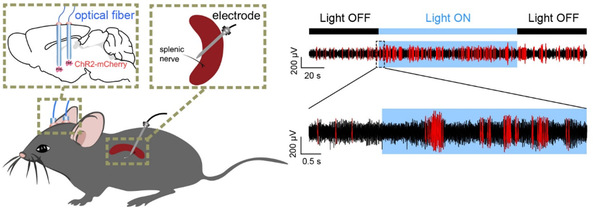
Research carried out collaboratively by Professors Qi Hai and Zhong Yi from Tsinghua University and Professor Hu Ji from the School of Life Science and Technology (SLST) of ShanghaiTech University was published in a Nature article titled “Brain control of humoral immune responses amenable to behavioral modulation.” The researchers identify a specific brain-spleen neural connection which can autonomically regulate the formation of plasma cells. This study, for the first time, shows that immune modulation can be achieved through a bodily behavioral regimen.
In order to study the brain origin of autonomic neutral activities regulating humoral immunity, the researchers applied retrograde tracking by injection of pseudorabies virus into the spleen and defining the PVN and the CeA as two prominent brain stress regions neurally connected to the spleen. Cell ablation or pharmacogenetic inhibition of CRH neurons in both PVN and CeA reduced plasma cell formation, whereas pharmacogenetic activation of these neurons elevated plasma cell abundance following immunization.
They further developed a behavioral regimen that allows mice to stand on an elevated platform (EPS) to activate PVN and CeA CRH neurons and increase plasma cell formation following immunization. Importantly, mice immunized with EPS behavioral regimen produced more antigen-specific IgG antibodies in a manner dependent on CRH neurons in the PVN and CeA. This study not only identifies a specific brain-spleen neural connection that modulates the formation of plasma cell formation autonomically, but also demonstrates immune modulation by a bodily behavioral regimen. Therefore, this work reveals neuronal regulation of adaptive immunity and suggests the possibility of enhancing host immune capacity through behavioral intervention.
Stress refers to the state of high tension in animals or humans caused by external stimulation. In modern society where competition is fierce, people are under stress every day, and pandemics like COVID-19 are an additional strong source of stress. Therefore, the field of stress neurobiology is at the forefront of science and is in high demand worldwide. Professor Hu’s team has been working on neural circuits and cellular mechanisms of stress and a number of important articles have been published in scientific journals such as Current Biology and Neuron.
Yuan Yuan, a Ph.D. student from SLST of ShanghaiTech, is a co-first author of the paper, and Professor Hu Ji serves as a co-corresponding author.
ShanghaiTech University


